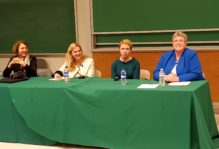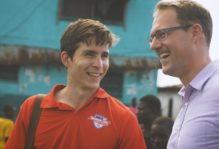First Do No Harm
Most of the pre-med and pre-health students I know get into their career paths from a place of deep care for others, wishing to be part of healing individual’s bodies and promoting the health of whole communities. But along with this care for others comes the unique pressures of preparation for their career ahead, and the application processes that await them. Course requirements to get through, interview schedules to juggle, standardized tests… and that nebulous factor of volunteering and “clinical experience.”
Noelle Sullivan, a professor at Northwestern University, spoke at a conference I attended recently on this very topic. She told chilling stories of how ambition and internalized pressure among pre-health undergraduates can often lead to real harm done for patients in other countries when they show up as unskilled volunteers and reach beyond their training. Very often they arrive with a clear sense of ethical boundaries, but can be pressured by other volunteers to overstep lines. She witnessed untrained high school and college students delivering babies, their access granted by the fee they paid to the program and the impression of expertise imbued by a borrowed white coat. Some particularly ghastly stories included those of a student intervening in a breach birth in violation of medical protocol, and an 18 year old student preparing to amputate an unconscious patient’s leg. Much of her talk is neatly captured in this piece she wrote for Motherboard.
Having spent the last eight years overseeing our alternative break program, my ears have been finely tuned to these issues. Do our volunteers have the necessary skills required to do what is asked of them? And especially with healthcare programs, would they be allowed to do those very things here in the US? As it turns out, not all volunteering is good. In fact, medical volunteering can do serious harm, perpetuating systems that result in poor care, and even danger to patients. (Another example of good intentions gone very wrong is orphanage volunteering, which creates “care” approaches that violate the best standards of residential care, and may even contribute to human trafficking.)
It is possible for you to do good while gaining experience. Lots of thoughtful people have spent years researching this issue, and developing guidelines (pdf) to follow (also here). Others have researched the impacts of pre-health volunteers on communities. Even if you’re not pre-health, you may be considering any number of gap year or volunteer possibilities, including many that are available at free clinics and other places in your own community or elsewhere in the US. I urge you to research them like you would a paper that really matters to you — here are seven quick things to consider – and review your options as carefully as you do the schools to which you will apply.




No comments.
Comments are currently closed. Comments are closed on all posts older than one year, and for those in our archive.